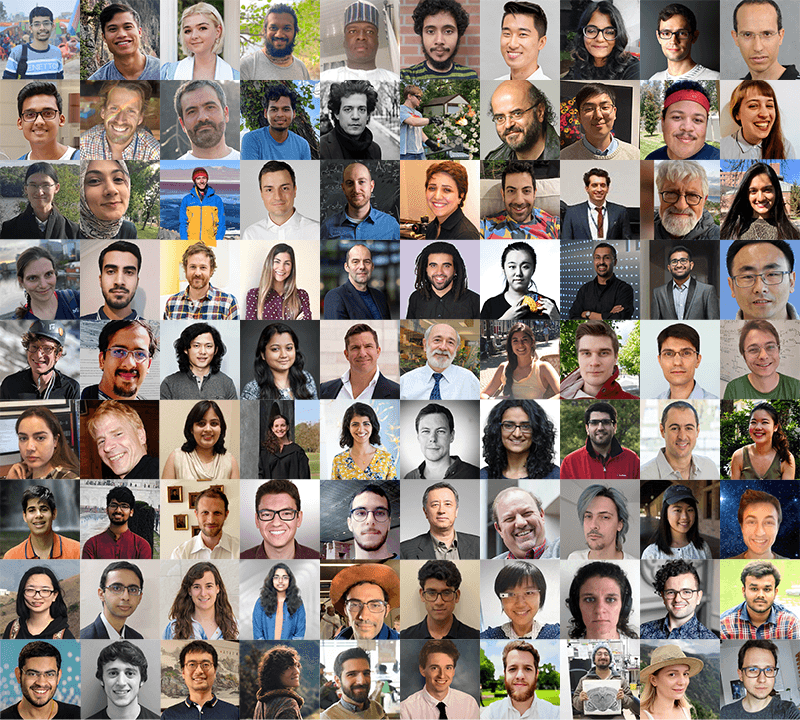Directors: Gabriel Kreiman, Boston Children’s Hospital, Harvard Medical School; Boris Katz, Massachusetts Institute of Technology; and Tomaso Poggio, Massachusetts Institute of Technology
Schedule: BMM Summer Course 2020 Schedule (PDF - last updated Aug. 21)
Given the Covid-19 situation, the meeting in Woods Hole for 2020 has been canceled. Instead, there will be an exciting Virtual BMM summer course for two weeks from August 10th through August 21st.
The virtual BMM summer course will be partially supported by a generous gift from Fujitsu Laboratories Ltd.
BMM Virtual Summer Course 2020 Class Photo

(download higher resolution)
Update: July 30,2020: Registration is now closed.
Ongoing CBMM Talks: To receive information on future CBMM talks, please subscribe to our listserv here - http://mailman.mit.edu.ezproxy.canberra.edu.au/mailman/listinfo/cbmm-talks
Unofficial Slack Channel: Gleb Zarin was kind enough to create this for you to converse as we are not providing an official Slack Channel for BMM Summer Course 2020 - https://join.slack.com/t/bmmsummercourse2020/shared_invite/zt-ghiwco76-8...
Update (July 17, 2020)
- There will be no projects this year.
- All of the presentations will be live.
- There will be ample opportunities for interactions and Q&A, including poster sessions, discussion panels and interactive lectures.
- If you applied to the summer course this year, there is no deferral for next year. Students need to apply again if they are interested in the Summer Course 2021 edition.
Course Description
The basis of intelligence – how the brain produces intelligent behavior and how we may be able to replicate intelligence in machines – is arguably the greatest problem in science and technology. To solve it, we will need to understand how human intelligence emerges from computations in neural circuits, with rigor sufficient to reproduce similar intelligent behavior in machines. Success in this endeavor ultimately will enable us to understand ourselves better, to produce smarter machines, and perhaps even to make ourselves smarter. Today’s AI technologies, such as Watson and Siri, are impressive, but their domain specificity and reliance on vast numbers of labeled examples are obvious limitations; few view this as brain-like or human intelligence. The synergistic combination of cognitive science, neurobiology, engineering, mathematics, and computer science holds the promise to build much more robust and sophisticated algorithms implemented in intelligent machines. The goal of this course is to help produce a community of leaders that is equally knowledgeable in neuroscience, cognitive science, and computer science and will lead the development of true biologically inspired AI.
The class discussions will cover a range of topics, including:
- Neuroscience: neurons and models
- Computational vision
- Biological vision
- Machine learning
- Bayesian inference
- Planning and motor control
- Memory
- Social cognition
- Inverse problems & well-posedness
- Audition and speech processing
- Natural language processing
These discussions will be complemented in the first week by MathCamps and NeuroCamps, to refresh the necessary background. Throughout the course, students will participate in workshops and tutorials to gain hands-on experience with these topics.
Core presentations will be given jointly by neuroscientists, cognitive scientists, and computer scientists. Lectures will be followed by afternoons of computational labs, with additional evening research seminars. To reinforce the theme of collaboration between (computer science + math) and (neuroscience + cognitive science), exercises and projects often will be performed in teams that combine students with both backgrounds.
The course will culminate with student presentations of their projects. These projects provide the opportunity for students to work closely with the resident faculty, to develop ideas that grow out of the lectures and seminars, and to connect these ideas with problems from the students’ own research at their home institutions.
This course aims to cross-educate computer engineers and neuroscientists; it is appropriate for graduate students, postdocs, and faculty in computer science or neuroscience. Students are expected to have a strong background in one discipline (such as neurobiology, physics, engineering, and mathematics). Our goal is to develop the science and the technology of intelligence and to help train a new generation of scientists that will leverage the progress in neuroscience, cognitive science, and computer science. The course is limited to 35 students.
Course Speakers:
Barbu, Andrei, MIT
Desimone, Bob, MIT
DiCarlo, Jim, MIT
Freiwald, Winrich, The Rockefeller University
Gershman, Sam, Harvard University
Kanwisher, Nancy, MIT
Kaelbling, Leslie, MIT
Katz, Boris, MIT
Kreiman, Gabriel, Children's Hospital Boston, Harvard Medical School
Livingstone, Margaret, Harvard Medical School
Madry, Alexander, MIT
McDermott, Josh, MIT
Murty, Venkatesh, Harvard University
Oliva, Aude, MIT
Papadimitrious, Christos, Columbia University
Poggio, Tomaso, MIT
Rosasco, Lorenzo, Italian Institute of Technology
Roy, Nicholas, MIT
Serre, Thomas, Brown University
Schulz, Laura, MIT
Sompolinsky, Haim, Harvard University
Tegmark, Max, MIT
Tellex, Stefanie, MIT
Tenenbaum, Joshua, MIT
Torralba, Antonio, MIT
Ullman, Shimon, MIT, Weizmann Institute of Science
Wilson, Matthew, MIT
Evening Lecture Series:
CBMM will also be hosting an Evening Lecture Series, including speakers from both industry and academia, in the fields of neuroscience, computer science, and cognitive science. Evening speakers will be listed as talks are confirmed.
Guest Speakers:
Koch, Christof, Allen Institute for Brain Science
Müller, Vincent C., TU Eindhoven
Nelson, Philip Google AI
Perona, Pietro, Caltech
